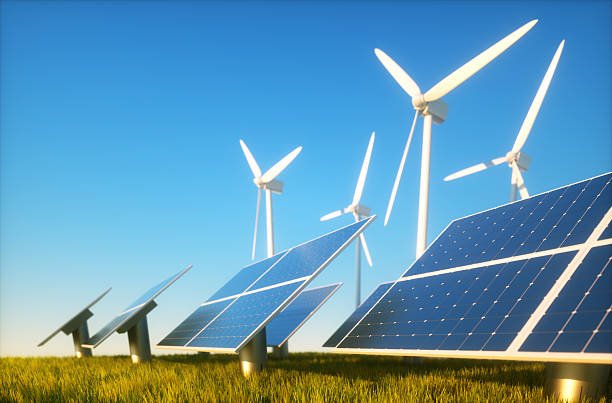INTRODUCTION:
The landscape of energy solutions is undergoing a significant transformation, and hybrid power solutions are at the forefront of this change. Businesses are increasingly looking to improve their energy efficiency, reduce costs, and become more sustainable. Hybrid power solutions, which combine multiple sources of energy, including renewable and traditional power sources, are emerging as a viable and flexible option. These systems allow businesses to harness the benefits of different energy sources while minimizing the risks associated with reliance on a single power source.
In this article, we will explore the future of hybrid power solutions for businesses, focusing on how these systems can meet the growing demand for clean, cost-effective, and reliable energy. We will discuss the role of renewable energy, advances in hybrid technology, and the importance of maintenance in ensuring the optimal performance of hybrid systems. As businesses continue to embrace hybrid solutions, it is essential to understand how these systems will shape the future of energy management.
WHAT ARE HYBRID POWER SOLUTIONS:
Hybrid power solutions refer to the integration of multiple power sources to create a more reliable and efficient energy system. These solutions typically combine renewable energy sources, such as solar, wind, or hydropower, with traditional sources like diesel or natural gas generators. By blending different energy sources, businesses can take advantage of the unique benefits each source offers, such as the low cost and availability of conventional power and the sustainability and environmental benefits of renewables.
One of the key advantages of hybrid power solutions is their ability to provide energy security. By relying on multiple energy sources, businesses can ensure that their operations remain uninterrupted even if one source experiences a disruption. Furthermore, hybrid systems can be tailored to meet the specific energy needs of a business, making them a flexible solution that can adapt to varying power demands and energy availability.
THE ROLE OF RENEWABLE ENERGY IN HYBRID SYSTEMS:
Renewable energy plays a crucial role in hybrid power systems, offering numerous environmental and economic benefits. Solar and wind power, in particular, are popular choices for integration into hybrid systems due to their abundance and decreasing costs. By incorporating renewable sources into their energy mix, businesses can reduce their carbon footprint, support sustainability initiatives, and lower their dependence on fossil fuels.
The integration of renewable energy into hybrid systems also helps businesses achieve greater energy efficiency. For example, during periods of high sunlight or wind, renewable energy can be harnessed to meet energy demands, while conventional generators can take over during low production periods. This balance between renewable and conventional energy ensures that businesses have a constant, reliable power supply, even when renewable resources are intermittent.
ADVANCES IN HYBRID POWER TECHNOLOGY:
As hybrid power systems become more popular, technological advancements are enabling greater efficiency, cost-effectiveness, and ease of integration. One of the most significant developments is the improvement in energy storage solutions, such as advanced battery systems. These batteries can store excess energy generated by renewable sources, ensuring that businesses can access power during periods of low production. Additionally, energy management systems (EMS) are being developed to optimize the use of multiple energy sources, allowing businesses to seamlessly switch between energy types and reduce costs.
Moreover, the digitalization of energy systems has opened up new possibilities for hybrid solutions. Smart meters, IoT devices, and AI-powered systems are helping businesses monitor their energy consumption in real-time, making it easier to manage energy usage, identify inefficiencies, and make informed decisions. These advancements are expected to play a critical role in the widespread adoption of hybrid power solutions, as they enable businesses to maximize their energy savings and minimize their environmental impact.
MAINTAINING AND SERVICING HYBRID SYSTEMS:
Like any energy system, hybrid power solutions require regular maintenance and servicing to ensure they perform at their best. Generator servicing and maintenance are crucial components of this process, as the generators in a hybrid system need to be kept in optimal condition to provide backup power when needed. Regular inspections, oil changes, and system diagnostics are essential to identify potential issues before they become costly problems.
Proper maintenance also help to extend the lifespan of the equipment, ensuring that businesses get the most value out of their investment. By working with experienced technicians and following a regular maintenance schedule, businesses can avoid unplanned downtime and ensure that their hybrid systems operate efficiently, even under the most demanding conditions.
ECONOMIC BENEFITS OF HYBRID SYSTEMS FOR BUSINESSES:
The economic benefits of hybrid power systems are substantial, making them an attractive option for businesses looking to reduce energy costs. By using renewable energy to supplement conventional power sources, businesses can lower their reliance on the grid, which can result in significant savings on electricity bills. Moreover, hybrid systems can be designed to optimize energy usage, reducing waste and improving efficiency.
In addition to lower operating costs, businesses can also take advantage of various financial incentives for adopting renewable energy. Government subsidies, tax credits, and grants are available in many regions to encourage businesses to invest in sustainable energy solutions. By incorporating hybrid power systems, businesses can not only save money in the long run but also contribute to the transition towards a greener, more sustainable energy future.
THE FUTURE OF HYBRID POWER SOLUTIONS FOR BUSINESSES:
Looking ahead, hybrid power solutions are expected to become even more sophisticated and widespread. As technology continues to evolve and renewable energy becomes more affordable, businesses will have access to even more advanced and efficient hybrid systems. The growing demand for sustainability and energy resilience will drive further innovation in hybrid power technologies, making them an increasingly attractive option for businesses of all sizes.
Furthermore, as the global energy landscape shifts towards cleaner alternatives, businesses that adopt hybrid power solutions will be well-positioned to lead the way in energy innovation. With the right investments in technology, maintenance, and energy management, businesses can future-proof their operations and play a key role in building a more sustainable energy future.
INTEGRATING HYBRID POWER SOLUTIONS INTO EXISTING INFRASTRUCTURE:
Adopting hybrid power solutions doesn’t mean starting from scratch; businesses can integrate them into their existing energy infrastructure. By upgrading current power systems with hybrid technology, companies can improve energy efficiency without requiring massive capital investments. This integration involves retrofitting conventional generators with renewable energy sources like solar panels or wind turbines, creating a hybrid system that can be managed effectively.
Furthermore, integrating hybrid power systems into existing infrastructures allows businesses to test new technologies on a smaller scale before fully committing. This approach mitigates the risks associated with large-scale projects while providing valuable insights into the performance of hybrid systems in real-world conditions. As businesses continue to explore hybrid options, the ability to integrate seamlessly into current operations will be a key factor in their adoption.
THE IMPACT OF HYBRID SYSTEMS ON BUSINESS OPERATIONS:
Hybrid power solutions have the potential to transform business operations by providing a more reliable, efficient, and cost-effective energy supply. With less reliance on the grid and the ability to harness renewable sources, businesses can ensure consistent power availability, even during grid outages or peak demand periods. This energy reliability enhances productivity and reduces operational downtime, which is crucial for businesses with high-energy demands.
In addition, hybrid systems allow businesses to monitor their energy consumption in real-time, giving them the tools to optimize operations and reduce waste. By leveraging energy management systems, companies can make data-driven decisions that improve operational efficiency, lower costs, and contribute to sustainability efforts.
REDUCING CARBON FOOTPRINT WITH HYBRID POWER SYSTEMS:
One of the most compelling reasons businesses are turning to hybrid power solutions is their potential to significantly reduce carbon emissions. By incorporating renewable energy sources like solar or wind into their power mix, companies can reduce their dependence on fossil fuels, leading to lower greenhouse gas emissions. This shift is not only crucial for meeting regulatory requirements but also for aligning with global sustainability goals.
Adopting hybrid systems can also enhance a company’s reputation, as more consumers and investors are prioritizing businesses with strong environmental credentials. In an era where sustainability is increasingly becoming a competitive advantage, hybrid power systems offer businesses the opportunity to lead in their industries while contributing to the fight against climate change.
Read Also: HARO Backlinks
CONCLUSION:
The future of hybrid power solutions for businesses is bright, with advancements in technology, energy storage, and digital systems paving the way for more efficient and sustainable energy use. By integrating renewable energy sources with traditional generators, businesses can reduce their carbon footprint, lower energy costs, and ensure energy security. As the demand for clean and reliable energy continues to grow, hybrid power solutions will play a crucial role in meeting the energy needs of businesses worldwide.
In addition to the environmental and economic benefits, the ongoing need for servicing and maintenance will remain a critical factor in ensuring the longevity and performance of hybrid systems. With the right maintenance practices, businesses can maximize the value of their hybrid power systems and position themselves for long-term success in a rapidly evolving energy landscape.






